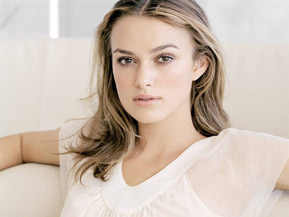On the Big Board |
| Position |
Staff |
In Brief |
| 22/98 |
David Mumpower |
This tale of court intrigue surrounding her loveless marriage of convenience (and title) and fall from grace at court proves a showcase role for Keira Knightley's natural talent. |
| 23/43 |
Kim Hollis |
There's some interesting political intrigue in there, but it is a little overwrought. |
| 52/196 |
Max Braden |
Feinnes actually does a good job of representing a man of the time rather than playing a carictature of one. But this isn't about fashion like the trailer implies. |
Another year, another Keira Knightley period drama. At 23, the English-born actress is building a respectable reputation for choosing classy, memorable roles, which she manages to balance with a burgeoning Hollywood career. Maybe she wants to prove she’s not just another pretty face, or maybe she’s still gunning for that Oscar (she was nominated once for Pride and Prejudice). Or maybe she just knows good material when she sees it, and given the early buzz and entrancing trailer, The Duchess looks like good material. Traditional material, yes, but good material all the same.
Period dramas, especially those from the UK (Pride and Prejudice, Atonement), have done commendable business stateside, and there’s little reason to think The Duchess won’t continue the trend. Paramount Vantage is wise to release its historical drama in the middle of awards season, a time when films of this nature thrive in limited release and gradually expand all the way up to the Oscars.
In the film, Knightley plays Georgiana, Duchess of Devonshire, an 18th century socialite known for her style and political activism (she’s often credited as the first woman to campaign for an election). Georgiana was also known for her unorthodox marriage to the Duke of Devonshire (played in the film by Ralph Fiennes), whom she shared in a ménage-a-trois relationship with Lady Elizabeth "Bess" Foster (Hayley Atwell). It remains to be seen if the filmmakers will make their ménage-a-trois a simple three-person living arrangement or a sexual relationship. If it's the latter, it could turn out to be one of the film's erotic selling points.
As a woman with a strong social prominence, the Duchess also loved to gamble. She allegedly died with a debt of nearly 20,000 pounds. Clearly, she led a fascinating enough life to have an entire feature made about her. Paramount can only hope audiences find this fashionable, trend-setting beauty more captivating than her French contemporary, Marie Antoinette (the Sofia Coppola movie of the same name grossed less than $16 million in 2006).
What will help The Duchess in its quest for box office is its practically guaranteed award nominations, especially the cosmetic ones like costumes, makeup, and set design, which will give the studio a lot to brag about. And if Knightley’s performance is worthy enough, she too could earn some accolades (the Academy may even feel she was cheated out of a nomination for Atonement).
Through the winter, The Duchess should have the intrigue and staying power to become a mid-level hit, grossing north of $25 million in the U.S. and even more from its native UK. It won’t be the star power that gets it there (other than Knightley and Fiennes, the cast is relatively unknown); it will be the target audience of mature adults, who are often underestimated as formidable ticket-buyers. It may be teens who amount to the record-breaking opening weekends, but it’s adults who keep a movie around for months at a time. (Matthew Huntley/BOP)
|
|
|
|

![]() Tweet
Tweet



